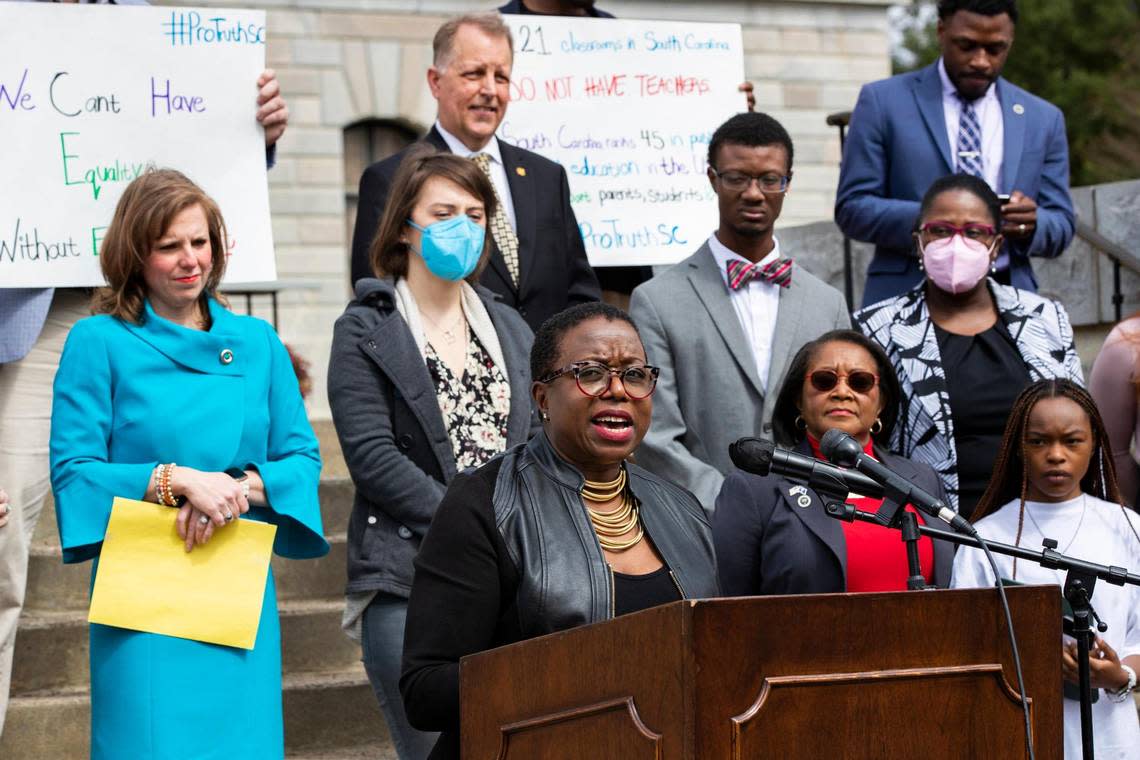Over SC teacher complaints, Senate OKs anti-CRT bill banning ‘subjective’ lessons
A South Carolina proposal barring the instruction of certain concepts centered around race in public K-12 classrooms has cleared both legislative bodies in the General Assembly over challenges from teachers and Senate Democrats, whose pleas to pass hate crime legislation went unanswered.
In the final week of the regular session and after nearly six hours of debate Wednesday, the S.C. Senate in a 27-10 vote along party lines passed a House-backed bill — H. 3728 — that would prohibit certain concepts, including those considered to be promoting critical race theory, from being taught in South Carolina’s public schools. As Republicans celebrated the move as a victory, Democrats, who tried to use the debate as a basis for bringing a hates crimes measure, H. 3014, to a vote, said the state shouldn’t have one law without the other.
“I’m certainly not gonna apologize for my great-grandfather, my grandfather, or even my father’s conduct,” state Sen. Dick Harpootlian, D-Richland, said on the Senate floor Wednesday. “But we have a chance to say to those folks who have not had power, whose ancestors did suffer and suffer mightily, and are still suffering — because there is still racism in our society — (that) this is some salve to their concerns, and it doesn’t cost you anything.”
“So, look into your heart and have the courage to do what I didn’t have the courage to do 50 years ago,” Harpootlian continued, referring to a time when he said he witnessed an act of racism toward a Black couple and did nothing about it.
The so-called “Transparency and Integrity in Education Act” would prohibit public schools from suggesting that by virtue of a student’s race or sex, that student bears responsibility for actions committed in the past by other members of the same race, sex, ethnicity, religion, color, or national origin. And it would let parents, and anyone else, review a school’s curriculum and instructional materials.
The bill’s success is largely attributed to procedural maneuverings by Senate Majority Leader Shane Massey, R-Edgefield, who last week told colleagues on the floor that the anti-CRT measure would serve to stop hate, while the hates crimes bill would not.
“The citizens of South Carolina do not want political activism in the classroom,” Massey said in a news release late Wednesday. “H. 3728 keeps the subjective opinions of those who want to rewrite American history from creeping into South Carolina’s schools.”

Critical race theory is a process of examining how institutions and public policies — such as zoning, policing, banking, health care and more — have created or increased inequality. For example, an article from the University of California Los Angeles Law Review used critical race theory to analyze school discipline to argue that underlying prejudices and strict school discipline policies lead to minority students being disproportionately punished.
But the state Department of Education has said critical race theory is not and has never been incorporated in schools curriculum, despite some parents and lawmakers arguing that it is being currently taught inside South Carolina classrooms.
“There are no accounts that we’re aware of where this has occurred in our schools,” state Sen. Ronnie Sabb, D-Williamsburg,” referring to CRT instruction. “And so then, is (H. 3728) not a solution, looking for a problem?”
The Senate on Wednesday amended the House proposal, for example adding language proposed by Sen. Gerald Malloy, D-Darlington, that expressly would allow teachers to teach about the Reconstruction period, Jim Crow and segregation, “with an emphasis on lynchings and other crimes committed based upon the race of the victim.”
Another Senate amendment, approved in committee, removed language requiring teachers to notify parents of any changes in the curriculum following the start of the school year by posting their lesson plans and instructional materials on the district’s website three days before presenting the material before students.
The amended legislation heads back to the House for further consideration.
Ironically, the Senate debated occurred during Teacher Appreciation Week, which state Sen. Mike Fanning, D-Fairfield, called shameful.
“Not a single teacher in South Carolina has asked for this bill,” Fanning said. “In fact, to the opposite. Teachers had been in the gallery all week. They’d been contacting us, telling us don’t pass this bill, and in Teacher Appreciation Week, we say ‘Forget y’all. We haven’t listened to you before. We’re not going to start now.’”
Critics and teachers groups continue to say bills such as H. 3728 are nothing more than an attempt by conservative lawmakers to censor the teaching of Black history and other important historical contexts in public schools.
Book bans have been popping up in school districts all around the state, with the latest being in Anderson and Pickens counties.
District officials in Anderson 1 recently removed several books — including “The Handmaid’s Tale,” a book chronicling extremest measures taken to curb abortions in a dystopian American society — from its shelves following complaints made by parents and national conservative parents group, Moms for Liberty. Meanwhile, school board members in Pickens County were slapped with a federal lawsuit for removing a book that discussed race and anti-racism in America.
“Just this week, books like the “Bluest Eye” ... and “Black is a Rainbow Color” were banned,” Fanning said. “We have been banning books in South Carolina under the guise of transparency and CRT.”
Massey, however, said otherwise.
“Mr. President (Thomas Alexander, R-Oconee), this legislation does not ban books,” Massey said. Rather, “it sets out a policy of prohibited conduct.”
